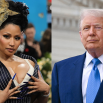Robert McCulloch is the prosecuting attorney that was presiding over the Ferguson grand jury, which means that he has been under intense scrutiny from day one. McCulloch has also been blamed for Darren Wilson not being indicted in the Aug. 9 shooting death of Michael Brown. The general consensus of the public seems to be that if the prosecution really wants an indictment, they'll get it, so the underlying feeling has been that McCulloch didn't push too hard for what many believe would have been justice for Brown. Unfortunately, the attorney hasn't helped his image at all by giving a recent interview to KTRS 550 and making some stunning admissions.
During the radio interview, McCulloch admitted that he purposely allowed some witnesses to testify in front of the grand jury that even he knew weren't telling the truth. He claims that some of the more inaccurate testimony came straight from a newspaper article that was equally inaccurate.
"Clearly some were not telling the truth. Early on I decided that anyone who claimed to have witnessed anything would be presented to the grand jury," said McCulloch on Friday. One really important detail that seems to have been lost in this case is that it isn't the typical kind that a prosecutor would even find himself dealing with simply because the majority of cases that end up before a grand jury do so because an indictment is expected. That was never the case here. What transpired between Wilson and Brown truly is only 100% known by them and because of that, McCulloch likely appeared to be on the fence, perhaps with good reason. By taking that position of uncertainty, he likely offered up everything that he had to that grand jury in the hopes that they would figure things out.
He also claimed that there was no good time to announce the grand jury's decision not to indict, so doing it after dark on Nov. 24 didn't really matter to him. People that were going to use it as an excuse to riot and protest were going to do so regardless of the time of day. Everyone that had followed this case since last August had an inkling that things were going to turn hostile if there wasn't an indictment, regardless of the time of day or night. In McCulloch's mind, making the announcement later in the day probably meant that a lot of small children were safely at home when the rioting began.
Do you think that it was wrong for McCulloch to knowingly throw dishonest witnesses into the mix? Do you think that if the grand jury heard their testimony and didn't believe it, then it ultimately made it easier not to charge Wilson? Or did they need to see the full spectrum of what people were bringing to the table as witnesses? Tell us your thoughts in the comments below!
© 2026 MusicTimes.com All rights reserved. Do not reproduce without permission.




